The Journals of Ayn Rand Read online
Page 23
Tentative Plan
Introduction: Roark’s ambition, setting him against society. Graduation, with flashback to school days; work as draftsman, one definite break with boss. 1923
First commission and own office: society reacts-his first tragic failure. 1926
Poverty-work as quarryman.
(Attempt at bribe to Ecole des Beaux Arts.) 1928 [This seems to refer to an attempt to bribe Roark into submission to conventional architectural standards, by offering him some prestigious honor from the Ecole des Beaux Arts.]
Personal—meeting with Dominique.
Back in New York Commission. First critical fury. Beginning of a grudging recognition.
Personal—secret affair with Dominique.
Setbacks: The competition which Peter wins. Personal: Dominique marries Peter. The unfinished building? 1929-32
Dominique-Wynand. Their marriage. 1933
Peter’s zenith and beginning of downfall.
Roark’s rise. 1934
Wynand commissions Roark to build country home.
Roark-Wynand. Roark-Dominique. 1935
Roark-Peter: The housing project. 1936
“Ford” Building.
The crisis. Trial. Dominique-Wynand. 1937
The Wynand Building. 1938
Roark meets Dominique: 1928 (summer). He is 28, she is 25.
Their affair: 1929-30.
Dominique marries Peter: early 1931.
Dominique marries Wynand: 1933.
Wynand engages Roark to build home: 1935.
Crisis: 1937.
Roark-Dominique united: 1938 (he 38, she 35).
Outline of Roark’s architectural career. (Highlights of his important buildings and his worst tragedies.)
Outline of Peter’s career. (Highlights of his buildings and rise. Highlights of his downfall.)
The affair of Roark-Dominique. Their break.
Personal life: Peter-Dominique.
Personal life: Wynand-Dominique.
The change which forces Dominique back to Roark.
The relationship: Roark-Wynand.
The career and life of Toohey.
The climax-Roark’s crime and trial.
The climaxes and points to build to:
Part I: That Roark fails and Peter wins.
Part II: That Roark loses to Toohey. The burden of Peter’s glory.
Part III: That Roark overcomes Toohey. Beginning of Peter’s downfall.
Part IV: That Roark overcomes everyone. Peter’s downfall.
Next points:
Roark’s first women and his personal life up to Dominique—all of first part.
Roark’s women after Dominique’s marriage to Peter.
Toohey’s trick against Roark. (Involve Dominique, Wynand’s editor, the young millionaire, Toohey’s whole technique and his definite
advancement with the Wynand papers.)
Roark’s friends.
Roark’s temptation? Is there or is there not a situation for him? Not.
Roark-Dominique: what finally brings them together?
For Roark-Dominique lawsuit:
What would make Roark sue?
What can Toohey do to bring it about and to make Dominique say it?
What advantage results for Toohey, other than Dominique being fired?
What damage to Roark?
Precisely what makes Toohey want Dominique to be fired?
Toohey’s technique and illustration of his whole character?
1938
To think over.
Trouble for Dominique (early)—?
Wynand’s sadism (luxury for people out of the gutter)—?
Wynand’s one big attempt against Roark. (Roark’s heroic reaction,
Wynand’s turning point toward Roark and all things.)
Roark’s activity about securing jobs.
Roark’s activity about his kind of joy in life. (?) (Greatest part of book to last part and climax.)
Influence of Roark on all who come in contact with him. Roark brings out either the worst or the best in people. (The worst—Toohey. The best—Wynand.) Think this over in connection with every point in the outline of Roark’s career.
In construction: first—philosophy, second—architecture.
Roark-Wynand, Roark-Dominique, Roark-Toohey, Roark-Peter: In these [relations], the things which happen to these people affect Roark or vice versa. But he motivates them and all the major events of their lives.
On what occasions can Roark demonstrate his utter anti-socialness? Opportunities for second-handedness:professional—obedience to opinions of others, the end becomes the means, existence only in the eyes of others, nepotism;
personal—fear of public opinion, conventions and prejudices, sacrifice of one’s real self to others.
(Try to think out a type and a dramatic occasion for each.)
Roark’s situations come from his peculiar attitude and his disregard of all that would constitute tragedy to average people. As far as the plot and physical body of the novel is concerned, all the main events are motivated by the second-hand psychology (or Roark as its opposite).
The last part of the book is mainly Roark-Wynand. Consequently, the rest is preparation for it which is resolved in the main climax. This is: Dominique, Peter, Toohey. Concentrate on this for first part—building toward last.
(What if Roark is brought to Wynand, not through a house to build, but by the editor, as a rescue, as [Wynand‘s] greatest prey?) [This sentence was crossed out.]
March 31, 1938
Roark and Wynand
What is Wynand’s stage when he meets Roark?
Wynand is at the height of his success—and sick of it. He has married Dominique. His love for her is getting to a stage of mania—the despair of holding on to one thing in which he sees salvation and self-respect. One thing which he really wants—and now he wants her with all the passion of every other “wish he might have had.” His bitterness about his kind of life is growing steadily, but vaguely, obscurely, hidden. He denies it to himself, evades it, hides from it behind Dominique. He has not missed and betrayed everything, he tells himself, he has Dominique. But precisely for that very reason, one serious devotion in his life leads him to feel more strongly that which he has missed; it makes him realize—subconsciously, against his will—everything that he has betrayed.
Consequently, his attitude to Dominique is a feverish mixture of exaggerated joy and involuntary, exaggerated despair. This last is rarer. But there are sudden moments, like explosions, like subterranean grumblings of the earthquake to come, when he is madly bitter, unhappy at her—without reason. These are the first signs of the man breaking up. No one notices it except the editor [Alvah Scarret], who does not like it.
His attitude toward men around him is the same strange mixture, somewhat reversed; his spurts of sadism intensified, sometimes out of all proportion, to the limits of the permissible. He has never been as bitter toward men. He is getting worse, people say. The fact is that he is getting better—and does not know it, and does not want to know it. He now has strange moments of relaxation in his taunting of men, moments of dead calm, a hopeless, weary calm that [suggests] his greatest danger—indifference. Even this pastime no longer interests him. He is beginning to realize—subconsciously, for he would not yet admit it to himself—that even this means nothing, that it proves nothing and redeems nothing. This subconscious conclusion terrifies him, drives him to excesses. But it will take Roark to make him admit the conclusion in so many words. The editor, wise in his own way and in his unerring second-hander’s instinct, sees and recognizes the danger signs. He knows the coming loss to the second-handers’ camp of a great ally who has never really belonged to it. Consequently, Wynand’s excesses worry him less than his occasional terrifying indifference. Once, when Wynand refuses to act true to form, the editor goads him to it desperately.
This is the groundwork for Roark’s entrance into Wynand’s life.
What is Roark at the time?
This is the definite beginning of Roark’s final [triumph]. Not much money as yet, but much fame. Notoriety, rather, of the resentful kind. Complete self-assurance. He knows he has won. His indifference to people can afford now to be tinged with the slightest pity. There is a glow about him—of a great battle won. His calm is a challenge to others. His honesty—arrogance.
How does Roark take Wynand?
He sees through him at once. He sees more than the editor, more than Wynand himself. He is amused, at first; then soon begins to pity him, with a kind pity that respects, not insults. Ends by liking him. (One occasion of Roark’s gesture of faith in Wynand-either before or after Wynand’s attempt against him.)
How does Wynand take Roark?
Wynand is fascinated, at first. Completely and in spite of himself. Or rather, he does not fight against it, does not even analyze it. It is a complete, spontaneous emotion, so rare in him. He surrenders to it simply, naturally, and happily. He knows only that here is a man whom he really likes—which has never happened to Wynand before—a man to whom he likes to talk, simply, directly, sincerely. This after the first few taunts—and quite involuntary, unpremeditated. Then he realizes—with a little frightened start—that he actually respects the man. It is an entirely new feeling for Wynand; he enjoys it with an interested curiosity. So much for the beginning.
April 4, 1938
Then Wynand realizes the trap into which he has fallen—too late. He has one spurt of ferocious hatred against Roark, a last gesture of self-defense. Roark wins—which only makes Wynand like him more. (This may be the point where Wynand suddenly cancels the construction of his country home—for no apparent reason at all, only to take it up again shortly afterwards, knowing that nothing will make him cancel his house
or lose Roark.) Perfunctorily, almost as a matter of conscientiousness, Wynand goes through a few “temptations” of Roark—such as offering him huge real estate projects if he surrenders his ideals. It does not work. Not at all. Roark does not even hesitate for a moment, makes no great show of heroism and sacrifice in refusing. He refuses simply and immediately, as a man who does not ever see two, but only one course open to him. He does not even give Wynand the satisfaction of being indignant. If anything, he is slightly amused. He sees through Wynand’s game—the first victim to do so. To the editor’s terror, Wynand—instead of being furious at his defeat—is openly delighted. Openly even to himself. Not to Roark, of course, but openly enough for the editor to see it and for Wynand himself to realize it fully, to admit it to himself. In any future, lesser attempts, Wynand is now anxious for Roark to defeat him. Roark does.
And the great Gail Wynand comes to a point where Roark becomes the most precious thing in his life. Above Dominique, though Wynand does not admit it. Roark becomes his revenge against society, against that mob whom Roark is defying and to whom Wynand has surrendered. Wynand, at this stage, does not yet admit this surrender to himself, but he knows it already subconsciously, hence all his vague anguish, his peculiar spiritual hysteria. The full, conscious knowledge of it will come later, when he is forced to betray Roark.
At the moment, Roark becomes an obsession to him. In the most spiritual sense only, without the slightest possibility of the merest hint of sexual perversion, Wynand is actually in love with Roark. There are no definite events, no concrete speeches in which this is displayed. It is there, nevertheless. It is an instance of Wynand’s masochism, of which he has quite a taint. The torture of loving a man whom in many other ways he hates appeals to him. He hates him for everything that Roark is and he, Wynand, isn’t. He hates him as a challenge to his whole life, as the embodiment of his conscience. He loves him for these very reasons. Unrealized, there is in Wynand’s mind a twisted feeling of atonement in his love for Roark—his worst enemy. He is punishing himself for what he has done—by bowing before what he should have done. The bowing hurts him. He enjoys it for that. By being hurt—at this late date—he thinks he is atoning for the many hurts he has avoided: he is suffering for an ideal—for the first and last time in his life. As a gesture to all the ideals he should have, but did not, suffer for.
He now has two centers in his existence—Dominique as a joy he wished and obtained, Roark as a suffering he chose and accepted. He loses both at the same blow.
How he takes Roark’s love for Dominique is another great point to be considered at length separately.
Another important second-hander: The kind that does not form opinions because others hold them, but because they know instinctively this is what others will hold (e.g., Toohey, the editor). Toohey approves of a book, not because it is already popular, but because he knows unerringly that it will be popular. The barometers of the mob. The deadliest kind of second-handers.
Plan of the Last Part
Roark blows up the housing project.
His arrest. Wynand offers help immediately. (“I know. I understand. I admire. My entire resources at your service in your coming fight. G. W.”) Old lawyer comes out of retirement to take the case. Wynand supplies Roark’s bail.
Fury of indignation in the press all over the country. Roark maintains complete silence—no explanations given. Wynand papers come out alone to defend Roark. (Incident of woman who wants house by Roark.)
Toohey urges his union to strike against the “Ford” building. He does not hope or intend to win. Just a gesture to “finish” Roark. Wynand’s greatest crusade. His insane determination. The editor’s fight with him. Dominique’s threat-promise. (“I will love you if you stand by him. You don’t know what you’ll lose—if you don’t.”)
Utter failure of the Wynand papers. Boycott against them on a grand, general scale. His board of directors and the editor deliver an ultimatum. Wynand surrenders. His papers come out against Roark.
Wynand’s own, silent tragedy. He sees his second-hand power for what it is, fully, clearly and completely. He knows now the failure of his whole life. (Incident with housewife buying newspaper.)
Wynand-Roark. Wynand begs him to escape and jump bail. Roark refuses.
Dominique’s decision to escape with Roark the day before the trial. She tells him that she loves him. Begs him to escape and to continue his work abroad. She will pay Wynand his bail. She is “buying him from the State of New York.” Roark agrees.
Their escape [the night before the trial] to her country home (which he built). Old servants who see them there. Their first night together after many years.
Day of trial. Wynand is in Washington trying to use “pull” to save Roark. Roark does not appear. Alarm sent out for him.
That night. Dominique has arranged for private plane. Drives with Roark to the airfield. Mails letters to Wynand on the way. Fire in the “Ford” building—set by the strikers. Roark sees it on the way [to the airfield], rushes to building in spite of her protests. The situation of the unconnected water tank. Roark rushes up through the flames to save the building. Dominique tries to stop him. She falls down after trying to hold the elevator. Looks up into a battery of cameras.
Roark’s fight against the fire on his way up. He connects the tank and saves the building. Does not even care or notice when he is arrested. [Note the similarity here to her earlier story, The Skyscraper.]
Next morning. Wynand flies back to Washington in private plane. He knows nothing of the events of the night before. Drives to office from landing field. Sees extras in street, pays no attention. Peculiar reception of his office staff. He bawls them out for “missing a scoop.” They run away from him. The editor rushes into his office. “I told you so!” If he means Roark’s escape, Wynand laughs, why, he is delighted. The editor hands him a copy of a rival paper with the picture of Dominique in the mud, on the front page. The whole story of the fire is there, plus the information already gathered by the police about Roark and Dominique spending the night together at her country home. The editor is frantic as to their policy in this crisis. Wynand doesn’t even hear him. Wynand is quiet, gentle, the gentleness of a man who is not alive any more. He asks only where Dominique is, and hearing that she is at home, leaves the office, ignoring the editor’s hysterical questions.
Wynand-Dominique. When he comes home, he learns that she has just returned from the jail hospital (where Roark is) and that she is waiting to see him, Wynand. Their scene. He tries desperately to prevent her from saying one thing which he dreads. He starts by telling her that if she says the story isn’t true, it won’t be true; his great power will make it untrue. He begs her, in other words, to deny it. It’s true, she tells him. She laughs: his great power, what did it do for Roark? Wynand then talks hysterically, as if putting words into her mouth, telling himself what he has not heard from her, but wants to hear: that it is only an affair, he doesn’t mind, he was expecting it sooner or later, they will go abroad and forget it all. There are not reproaches from him, no anger, no thought of giving her up. Only a desperate plea for her not to leave him.
She tells him that she loves Roark. When she says it, she realizes that that is what he had been dreading. She expects an explosion. She defies him. She tells him everything and how much Roark really is to her. There is no explosion from him. No reaction. No words, after his recent outburst of them. He only mutters dully that if she wants a divorce, he’ll let her divorce him. He leaves the room. Her letter and check of the day before arrive.... The editor phones, begging frantically for instructions on their policy. Wynand tells him to do anything he pleases. The editor holds him to that, makes him repeat it. Wynand does not care.
Next morning. After a sleepless night, the full force of the blow has come to Wynand. It is his last outburst of emotion. He goes to Dominique’s room, begs her, threatens her, offers her anything to remain with him; she can have all the lovers she wants, but not that one! She can even leave him, Wynand, if she insists, and go with any other man, but not Roark. Anything, but not Roark! She is kind to Wynand this time; she understands, she is sorry for him. She lets him see that it is hopeless; that she will live or die for Roark. She knows that she and Wynand have both found the same thing in Roark; only it is too late for Wynand....

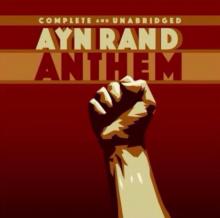 Anthem
Anthem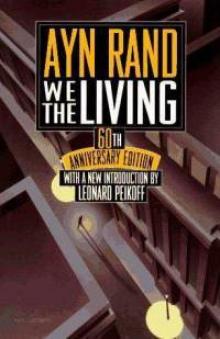 We the Living
We the Living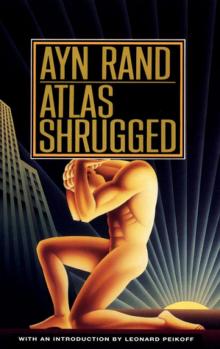 Atlas Shrugged
Atlas Shrugged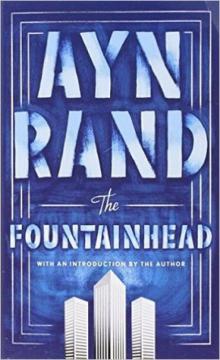 The Fountainhead
The Fountainhead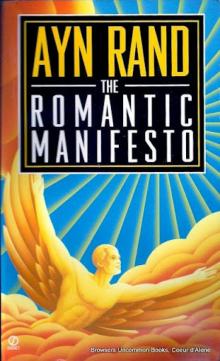 The Romantic Manifesto: A Philosophy of Literature
The Romantic Manifesto: A Philosophy of Literature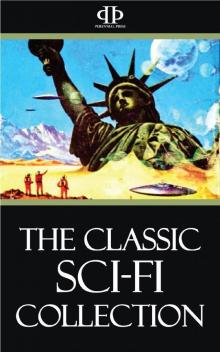 The Classic Sci-Fi Collection
The Classic Sci-Fi Collection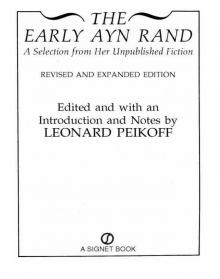 The Early Ayn Rand
The Early Ayn Rand